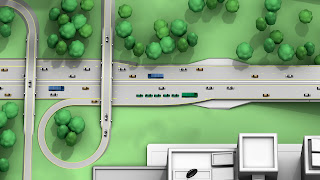SARTE test
GOTHENBURG : January 24, 2012 - The SARTRE project (Safe Road Trains for the Environment) - with Volvo Car Corporation as the only participating car manufacturer - has successfully completed the first test demonstrations of a multiple vehicle platoon.
The test fleet included a lead truck followed by three cars driven entirely autonomously at speeds of up to 90 km/h - with no more than 6 metres gap between the vehicles.
"The aim is for the entire road train to be completed in autumn 2012. By then we will have four vehicles after one lead vehicle driving at 90 km/h," says Erik Coelingh, technical project manager at the Volvo Car Corporation.
The SARTRE project is being driven by seven European partners and is the only one of its kind to focus on the development of technology that can be implemented on conventional highways in which platooned traffic operates in a mixed environment with other road users.
Stakeholder dialogue
Recognizing that the challenge of implementing road train technology on Europe's highways is not solely a technical matter, SARTRE also includes a major study to identify what infrastructure changes will be needed for vehicle platooning to become a reality. A number of stakeholder discussions will therefore be held. The participants in the first discussion included technical experts, politicians, legislators and traffic safety researchers. At the workshop a number of non-technical challenges for road trains were discussed, such as legal regulations, product liability and driver acceptance of automated vehicles.
Key future requirements identified were the need to agree a common terminology for platooning, such as criteria for defining when a vehicle becomes fully, as opposed to partially or even highly automated, and the need to address multiple and varied national regulatory law or to harmonize regulatory law.
Many benefits
The main advantage of road trains is that the car driver has time over to do other things. Road trains promote safer transport since the vehicle platoons are led by a professional driver in e.g. a truck and inter-vehicle reaction response times are much quicker. Environmental impact is reduced since the cars follow close behind each other and benefit from the lower air drag. The energy saving is expected to be in the region of up to 20 percent. Road capacity will also be able to be utilised more efficiently.
About the SARTRE project:
The SARTRE project stands for Safe Road Trains for the Environment. Part-funded by the European Commission under the Framework 7 programme, SARTRE is led by Ricardo UK Ltd and comprises collaboration between the following additional participating companies: Idiada and Robotiker-Tecnalia of Spain, Institut für Kraftfahrwesen Aachen (IKA) of Germany, and SP Technical Research Institute of Sweden, Volvo Car Corporation and Volvo Technology of Sweden.
SARTRE aims to encourage a step change in personal transport usage through the development of safe environmental road trains (platoons). Systems are being developed in prototype form that will facilitate the safe adoption of road trains on un-modified public highways with full interaction with non-platoon vehicles.
The project is addressing the three cornerstone transportation issues of environment, safety and congestion while at the same time encouraging driver acceptance through the prospect of increased "driver comfort". The objectives of SARTRE may be summarised as:
- To define a set of acceptable platooning strategies that will allow road trains to operate on public highways without changes to the road and roadside infrastructure.
- To enhance, develop and integrate technologies for a prototype platooning system such that the defined strategies can be assessed under real world scenarios.
- To demonstrate how the use of platoons can lead to environmental, safety and congestion improvements.
- To illustrate how a new business model can be used to encourage the use of platoons with benefits to both lead vehicle operators and to platoon subscribers.
If successful, the benefits from SARTRE are expected to be significant. The estimated fuel consumption saving for high speed highway operation of road trains is in the region of 20 percent depending on vehicle spacing and geometry. Safety benefits will arise from the reduction of accidents caused by driver action and driver fatigue. The utilization of existing road capacity will also be increased with a potential consequential reduction in journey times. For users of the technology, the practical attractions of a smoother, more predicable and lower cost journey which offers the opportunity of additional free time will be considerable. The SARTRE project formally started in September 2009 and will run for a total of three years. http://www.sartre-project.eu/
Video : Volvo part of successful road train test - SARTRE project enters final phase
Images : Volvo part of successful road train test - SARTRE project enters final phase
Video : Volvo part of successful road train test - SARTRE project enters final phase
Images : Volvo part of successful road train test - SARTRE project enters final phase
[Source : VOLVO]











Tidak ada komentar:
Posting Komentar